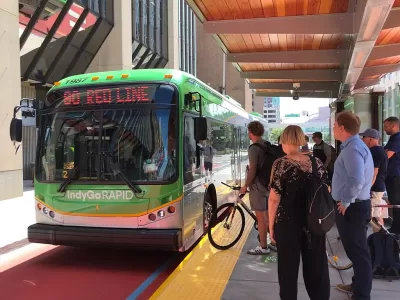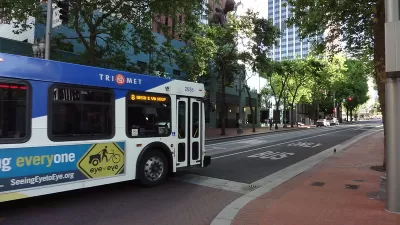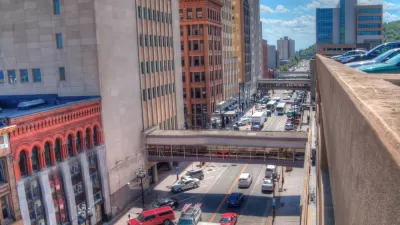The IndyGo board of directors scrapped a bus system redesign planned for launch in June 2020 as part of its Covid-19 emergency response. The transit agency is now seeking public feedback on a new map with similar changes.

IndyGo, the public transit service agency for the city of Indianapolis and the surrounding Marian County, is dusting off a bus system redesign plan it paused for the pandemic.
The “Central Indiana Transit Plan,” created in 2016, “outlined a 5-year vision that included three bus rapid transit routes, slightly fewer local bus routes that come more often over longer hours, and a map that resembles more of a grid system instead of the existing hub-and-spoke system that routes most buses through downtown,” according to an article by Kayla Dwyer for the IndyStar.
IndyGo made substantial progress on the plan, launching the Red Line in 2019, breaking ground on the Purple Line in 2022, and recently opening its first “Super Stop” last month. The transit agency has also seen costs on bus rapid transit (BRT) construction skyrocket and battled the state for funding in 2020, 2021, and 2022.
A new bus system based on a high-frequency grid, intended to go into effect in June 2020, was also scrapped during the pandemic, when the IndyGo board of directors “adopted an emergency plan in response to COVID-19 that delayed those changes indefinitely,” according to Dwyer.
To relaunch the system redesign, IndyGo has released an updated map, still promising “more efficient, faster service, at the expense of a few lower-ridership routes,” and is hosting a series of public meetings to gather feedback on the map.
“Currently, IndyGo's bus routes are split roughly into thirds in terms of 15-minute, 30-minute and 60-minute frequency. The proposed new map would have almost entirely 15- and 30-minute routes, apart from three 60-minute routes in southeast Indianapolis and 10-minute service on the Red, Purple and Blue Lines,” reports Dwyer.
More details about the changes to the system pam and the schedule for implementation are included in the source article below.
FULL STORY: IndyGo is proposing a new local bus route map. What to know and how to give input

Maui's Vacation Rental Debate Turns Ugly
Verbal attacks, misinformation campaigns and fistfights plague a high-stakes debate to convert thousands of vacation rentals into long-term housing.

Planetizen Federal Action Tracker
A weekly monitor of how Trump’s orders and actions are impacting planners and planning in America.

San Francisco Suspends Traffic Calming Amidst Record Deaths
Citing “a challenging fiscal landscape,” the city will cease the program on the heels of 42 traffic deaths, including 24 pedestrians.

Defunct Pittsburgh Power Plant to Become Residential Tower
A decommissioned steam heat plant will be redeveloped into almost 100 affordable housing units.

Trump Prompts Restructuring of Transportation Research Board in “Unprecedented Overreach”
The TRB has eliminated more than half of its committees including those focused on climate, equity, and cities.

Amtrak Rolls Out New Orleans to Alabama “Mardi Gras” Train
The new service will operate morning and evening departures between Mobile and New Orleans.
Urban Design for Planners 1: Software Tools
This six-course series explores essential urban design concepts using open source software and equips planners with the tools they need to participate fully in the urban design process.
Planning for Universal Design
Learn the tools for implementing Universal Design in planning regulations.
Heyer Gruel & Associates PA
JM Goldson LLC
Custer County Colorado
City of Camden Redevelopment Agency
City of Astoria
Transportation Research & Education Center (TREC) at Portland State University
Jefferson Parish Government
Camden Redevelopment Agency
City of Claremont





























